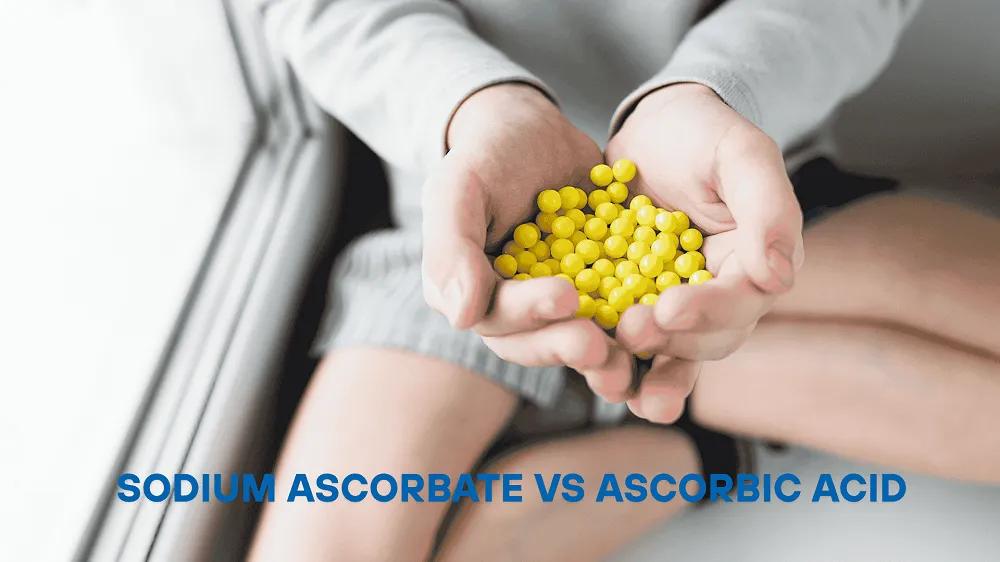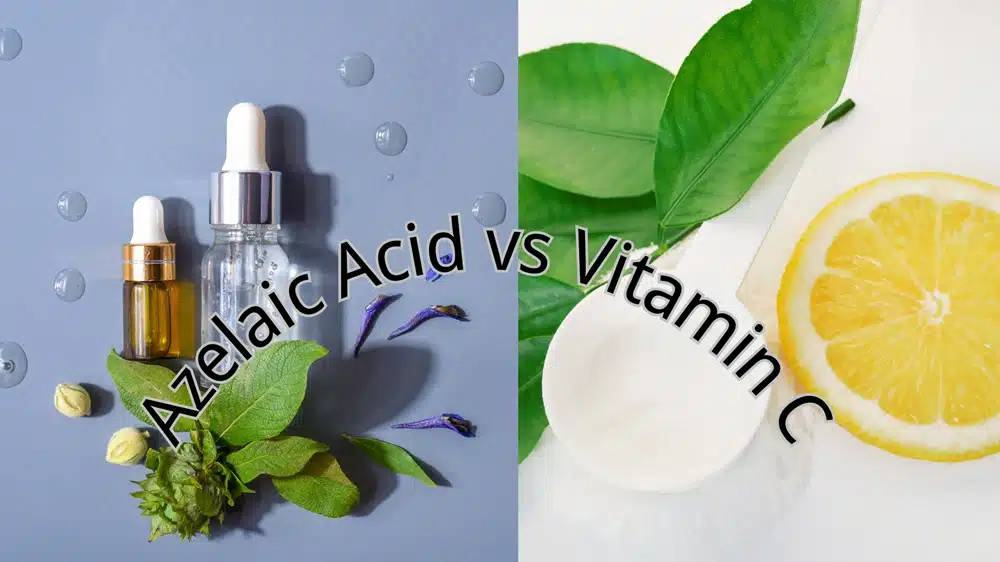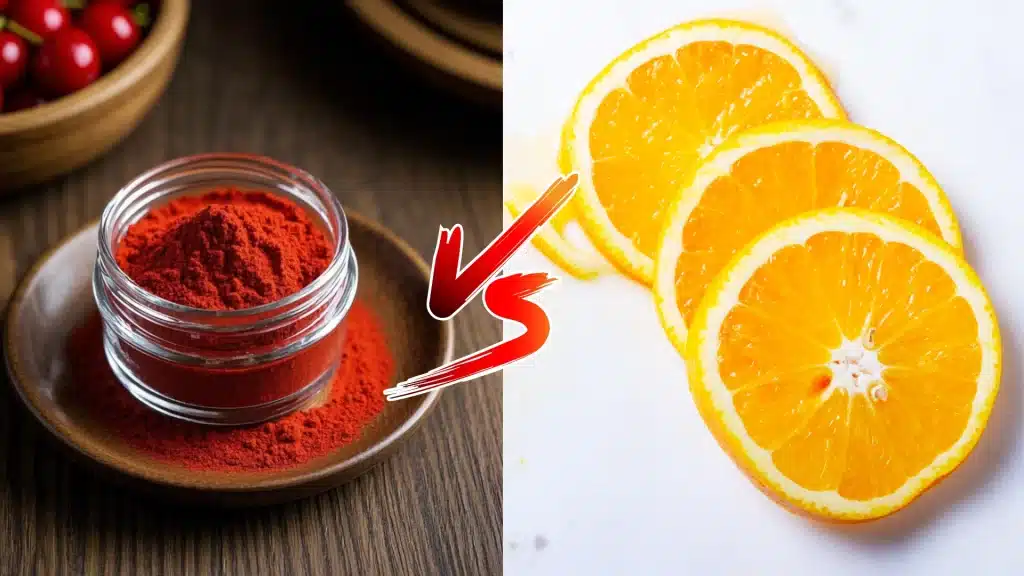Giriş
C Vitamini is a vital nutrient that supports your bağışıklık sistemi, helps your body make collagen, and acts as a powerful antioxidant to fight free radicals. Many people take Vitamin C supplements to stay healthy, but not all forms of Vitamin C are the same. The two most common types are Askorbik Asit ve Sodium Ascorbate. Each has unique properties, benefits, and uses. This article compares Sodium Ascorbate and Ascorbic Acid in detail to help you choose the right supplement for your needs. We’ll also highlight the role of Gensei, a leading company in producing high-quality Vitamin C supplements.
What is Ascorbic Acid?
Ascorbic Acid is the pure form of Vitamin C, a water-soluble vitamin found in fruits and vegetables like oranges, strawberries, and bell peppers. It has a simple chemical structure (C6H8O6) and is naturally acidic with a low pH. Ascorbic Acid can be extracted from natural sources or made synthetically in labs, which makes it affordable and widely available.

Uses and Supplement Forms
Ascorbic Acid is used in many ways. In the food industry, it preserves freshness in products like juices and canned goods. In supplements, it comes in forms like:
- Tabletler: Easy to swallow and common in daily supplements.
- Kapsüller: Often used for precise dosing.
- Powders: Mixed with water for a quick dose.
- Effervescent tablets: Dissolve in water for a fizzy drink.
Ascorbic Acid Benefits
Ascorbic Acid is highly effective. It supports your immune system by helping white blood cells fight infections. It also promotes collagen production, which keeps your skin, joints, and blood vessels healthy. As an antioxidant, it protects cells from damage caused by free radicals, which may reduce the risk of chronic diseases like heart disease.
Dezavantajlar
Because Ascorbic Acid is acidic, it can irritate the stomach, especially for people with sensitive digestive systems. High doses (above 2,000 mg per day) may cause diarrhea, nausea, or heartburn. In rare cases, long-term high doses might increase the risk of kidney stones in some people.
What is Sodium Ascorbate?
Sodium Ascorbate is a buffered form of Vitamin C. It is made by combining Ascorbic Acid with sodium bicarbonate, creating a sodium salt (C6H7NaO6). This form is less acidic, with a higher pH, making it gentler on the stomach. Sodium Ascorbate is often used in supplements and medical treatments like intravenous (IV) Vitamin C therapy.

Uses and Supplement Forms
Sodium Ascorbate is popular in supplements because it’s easier to digest. It’s available in forms like:
- Soft and Hard Capsules: Convenient for daily use with controlled dosing.
- Çiğneme Tabletleri: Tasty and easy for people who don’t like swallowing pills.
- Sakızlar: Popular with kids and adults for a fun, flavorful option.
- Powders: Mixed with water or food for flexible dosing.
Sodium Ascorbate Benefits
Sodium Ascorbate provides the same health benefits as Ascorbic Acid, including immune support, collagen production, and antioxidant protection. Its main advantage is being gentler on the stomach, which makes it ideal for people with acid reflux or sensitive digestion. It’s also often used in high-dose Vitamin C therapies because it’s less likely to cause irritation.
Dezavantajlar
The sodium in Sodium Ascorbate (about 11% of its weight) can be a concern for people on low-sodium diets, such as those with high blood pressure or kidney problems. For example, 1,000 mg of Sodium Ascorbate contains about 110 mg of sodium, which may add up if you take high doses.
Key Differences Between Sodium Ascorbate and Ascorbic Acid
To choose the right supplement, you need to understand how these two forms differ. Here are the key points:
Kimyasal Yapı
Ascorbic Acid is pure Vitamin C with a low pH (around 2-3), making it highly acidic. Sodium Ascorbate is a buffered form with a pH closer to neutral (around 6-7). This makes Sodium Ascorbate less likely to irritate the stomach or esophagus.
Biyoyararlanım
Both forms are well-absorbed by the body, delivering Vitamin C effectively. Studies show that Ascorbic Acid and Sodium Ascorbate have similar bioavailability, meaning your body gets the same amount of active C Vitamini from either form. However, Sodium Ascorbate may be better tolerated, allowing some people to take higher doses without discomfort.
Sindirim Toleransı
Ascorbic Acid’s acidity can cause digestive issues like heartburn or diarrhea, especially at doses above 1,000 mg. Sodium Ascorbate, being less acidic, is gentler and better suited for people with sensitive stomachs or conditions like gastritis.
Sodium Content
Sodium Ascorbate contains sodium, which may be a concern for people with hypertension, heart disease, or kidney issues. Ascorbic Acid has no sodium, making it a better choice for those on sodium-restricted diets.
Uygulamalar
Ascorbic Acid is widely used in food preservation and affordable supplements. Sodium Ascorbate is preferred in high-dose therapies (like IV treatments) and supplements for sensitive individuals. Both are available in various forms, but Sodium Ascorbate is more common in gummies and chewables due to its milder taste.
Supplement Types
Ascorbic Acid is often found in tablets, kapsüller, TOZLAR, and effervescent tablets due to its stability and low cost. Sodium Ascorbate is popular in soft capsules, chewable tablets, gummies, and powders, especially for products marketed to sensitive populations or children.
Benefits Comparison
Both forms share many benefits because they both deliver Vitamin C. Here’s a closer look:
Paylaşılan Faydalar
- Bağışıklık Desteği: Both help your body fight infections by boosting white blood cell activity.
- Kolajen Üretimi: They support healthy skin, joints, and blood vessels by aiding collagen synthesis.
- Antioksidan Koruma: Both neutralize free radicals, protecting cells from damage linked to aging and disease.
- Yara İyileştirme: Vitamin C from either form speeds up tissue repair and recovery.
Unique Advantages of Ascorbic Acid
- Uygun Maliyetli: Ascorbic Acid is cheaper to produce, so supplements are often more affordable.
- Yaygın Olarak Mevcut: It’s found in most Vitamin C supplements and fortified foods.
- Stable: Ascorbic Acid is highly stable, making it ideal for long-shelf-life products like tablets and powders.
Unique Advantages of Sodium Ascorbate
- Gentler on the Stomach: Its neutral pH reduces the risk of digestive discomfort, making it better for high doses or sensitive individuals.
- Preferred for High-Dose Therapy: Sodium Ascorbate is often used in IV Vitamin C treatments because it’s less likely to irritate tissues.
- Tastier in Chewables/Gummies: Its milder flavor makes it ideal for flavored supplements like sakızlar.
Yan Etkiler ve Dikkat Edilmesi Gerekenler
Both forms are generally safe when taken within recommended doses (typically 75-90 mg daily for adults, with an upper limit of 2,000 mg). However, there are some side effects to consider.
Askorbik Asit
- Sindirim Sorunları: High doses can cause heartburn, nausea, or diarrhea due to its acidity.
- Kidney Stone Risk: Excessive intake (over 2,000 mg daily) may increase the risk of kidney stones in some people, especially those with a history of kidney issues.
- Interactions: Ascorbic Acid may interact with certain medications, like blood thinners, so consult a doctor if you’re on medication.
Sodium Ascorbate
- Sodium Concerns: The sodium content can add up in high doses, which may be problematic for people with high blood pressure, heart disease, or kidney conditions.
- Mild Side Effects: Like Ascorbic Acid, high doses may cause diarrhea or nausea, but these are less common due to its buffered nature.
Dozaj Yönergeleri
The Recommended Dietary Allowance (RDA) for Vitamin C is 75 mg for women and 90 mg for men. Supplements often provide 500-1,000 mg per dose, which is safe for most people. Always follow the dosage on the product label or consult a healthcare provider, especially for high doses.
Gensei’s Role in Vitamin C Supplements
When choosing a Vitamin C supplement, quality matters. Gensei is a leading company in the supplement industry, known for producing high-quality raw materials and finished products. Gensei specializes in both Sodium Ascorbate and Ascorbic Acid, ensuring purity, potency, and bioavailability in every batch.
Gensei’s Expertise
Gensei uses advanced manufacturing processes to create Vitamin C that meets strict safety and quality standards. Their raw materials are tested for purity, free from contaminants like heavy metals or pesticides. This makes Gensei a trusted choice for supplement brands worldwide.
Product Range
Gensei offers a wide range of finished Vitamin C products, including:
- Soft and Hard Capsules: Precise dosing for daily use, ideal for adults.
- Çiğneme Tabletleri: Tasty and convenient for those who prefer not to swallow pills.
- Sakızlar: Fun and flavorful, great for kids and adults.
- Powders: Versatile for mixing into drinks or food, perfect for custom dosing.
Commitment to Innovation
Gensei invests in research to improve bioavailability and create supplements that meet diverse needs. For example, their Sodium Ascorbate products are designed for maximum digestive comfort, while their Ascorbic Acid products offer cost-effective solutions without compromising quality.
Which Should You Choose?
Choosing between Sodium Ascorbate and Ascorbic Acid depends on your health needs, dietary restrictions, and supplement preferences. Here are some factors to consider:
Sağlık Koşulları
- Sensitive Stomach: Choose Sodium Ascorbate for its gentler, buffered formula.
- Low-Sodium Diet: Opt for Ascorbic Acid to avoid extra sodium.
- High-Dose Needs: Sodium Ascorbate is better for high doses, especially in IV therapy or megadosing (under medical supervision).
Diyet Kısıtlamaları
- If you’re watching your sodium intake due to high blood pressure or kidney issues, Ascorbic Acid is the safer choice.
- If you need a tasty option (like gummies), Sodium Ascorbate is often used in flavored supplements.
Supplement Goals
- Genel Sağlık: Either form works well for daily immune support or collagen production.
- Sporcular: Sodium Ascorbate may be better for high doses to support recovery without stomach upset.
- Bütçe: Ascorbic Acid is typically more affordable.
Supplement Types
- Capsules/Tablets: Both forms are available, but Ascorbic Acid is more common in tablets.
- Chewables/Gummies: Sodium Ascorbate is often used for its milder taste.
- Powders: Both are available, but Sodium Ascorbate is easier to mix for sensitive stomachs.
Practical Tips
- Start with a low dose (e.g., 500 mg) and increase gradually if needed.
- Take Vitamin C with food to reduce stomach irritation, especially with Ascorbic Acid.
- Choose Gensei products for guaranteed quality and variety in supplement forms.
Sonuç
Sodium Ascorbate and Ascorbic Acid are both excellent sources of Vitamin C, but they serve different needs. Ascorbic Acid is affordable, widely available, and stable, but its acidity may cause digestive issues for some. Sodium Ascorbate is gentler on the stomach and ideal for high doses or sensitive individuals, though its sodium content requires caution for certain groups. Both are available in various forms, from capsules and tablets to gummies and powders, making it easy to find a product that fits your lifestyle.
Gensei stands out as a leader in producing high-quality Sodium Ascorbate and Ascorbic Acid supplements, offering a range of options like soft capsules, chewables, gummies, and powders. Their commitment to purity and innovation ensures you get the best Vitamin C for your needs.
Before starting any supplement, consult a healthcare professional to determine the right form and dose for you. Whether you choose Sodium Ascorbate or Ascorbic Acid, Vitamin C can be a powerful addition to your health routine.
Which is better, Sodium Ascorbate or Ascorbic Acid?
The choice between Sodium Ascorbate vs Ascorbic Acid depends on your needs. Ascorbic Acid is more affordable and widely available, ideal for general use. Sodium Ascorbate is gentler on the stomach, making it better for people with sensitive digestion or those taking high doses. If you’re on a low-sodium diet, Ascorbic Acid is preferable due to Sodium Ascorbate’s sodium content (about 110 mg per 1,000 mg dose). Consult a doctor to decide based on your health conditions.
Which form of Vitamin C is most effective?
In terms of effectiveness, Sodium Ascorbate vs Ascorbic Acid have similar bioavailability, meaning both deliver Vitamin C to the body efficiently. Effectiveness depends on your goal: Ascorbic Acid is cost-effective for daily immune support, while Sodium Ascorbate is better for high-dose therapies due to its buffered, less acidic nature. Other forms like liposomal Vitamin C may offer enhanced absorption but are pricier.
Is Sodium Ascorbate safe for kidney stones?
Sodium Ascorbate is generally safer than Ascorbic Acid for people prone to kidney stones. Ascorbic Acid’s acidity can increase oxalate levels in urine, potentially contributing to stone formation in high doses (over 2,000 mg daily). Sodium Ascorbate, being less acidic, may pose a lower risk, but high doses should still be monitored. Always consult a healthcare provider if you have a history of kidney stones.
Is Sodium Ascorbate good for an acidic person?
Yes, Sodium Ascorbate is better for people with acidic conditions (e.g., acid reflux or gastritis) in the Sodium Ascorbate vs Ascorbic Acid comparison. Its neutral pH (around 6-7) is less likely to irritate the stomach or esophagus compared to Ascorbic Acid’s low pH (2-3). This makes Sodium Ascorbate a preferred choice for those with sensitive digestion.
What is the healthiest Vitamin C to take?
The healthiest Vitamin C depends on your needs. In Sodyum Askorbat vs Askorbik Asit, Sodium Ascorbate is gentler and better for sensitive stomachs, while Ascorbic Acid is cost-effective and widely available. Both support immunity, collagen production, and antioxidant protection. For premium options, liposomal Vitamin C may offer better absorption. Choose high-quality supplements from trusted brands like Gensei and consult a doctor for personalized advice.
Why avoid taking Vitamin C at night?
Taking Vitamin C, whether Sodium Ascorbate or Ascorbic Acid, at night may disrupt sleep for some people due to its mild stimulant effect. It can increase energy or cause slight digestive discomfort (especially Ascorbic Acid) if taken on an empty stomach. However, this varies by individual. Taking Vitamin C with food earlier in the day is generally recommended to avoid potential issues.
What type of Vitamin C is better absorbed in the body?
In Sodium Ascorbate vs Ascorbic Acid, both are well-absorbed, with similar bioavailability. Sodium Ascorbate may be better tolerated, allowing higher doses without stomach upset, which can indirectly improve absorption for sensitive individuals. Liposomal Vitamin C, encapsulated in fat-like particles, may have superior absorption but lacks extensive research compared to traditional forms. Choose based on your digestive tolerance and budget.


